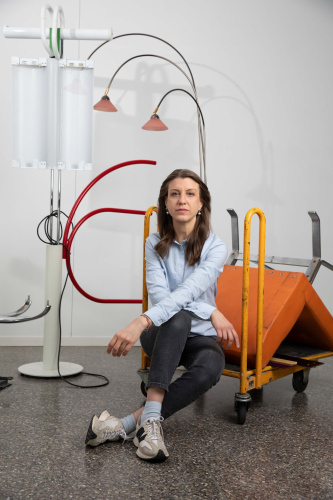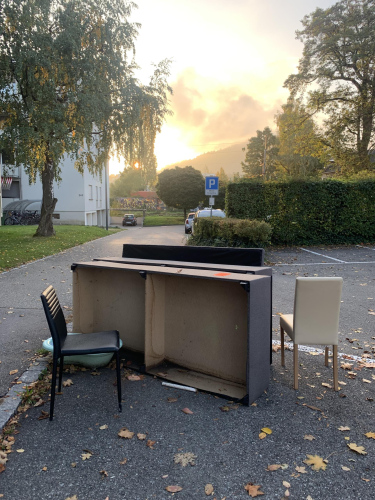ARTIST AUTHOR RESEARCHER
In her Fine Art practice Flurina Sokoll creates sculptural arrangements, installations and texts that arise from the concept of composition in dialogue with bulky waste that has been deposited on the roadside. Her aim is to present these human-non-human interwoven dialogues in such a way that poetic-aesthetic narratives stimulate reflection on touch and restoration, while at the same time making it possible to endure difficult-to-bear matter.
Working with waste, she feels overwhelmed by major socio-ecological issues of mass consumption and pollution, and thematises this by exploring exhaustion, exploitation, physical and mental overload, injury, responsibility, appreciation, care, hope, fragility, vulnerability and transience. To her the interaction with objects is necessary prerequisite for connecting the self with the world and, beyond the external, touching the sensual and meaningful dimension of being (non-)human. She aligns her approach politically and philosophically with Jane Bennett's 'Thing-Power'-Theory.
Focusing on the objects, she arranges, restores, modifies and interrogates in a process she describes as 'Tactile Composing' (after Kathleen Stewart). Shapes, colours and material properties, as well as rhythms, patterns, stories and images are examined through touch and movement. She stacks, combines, balances, cleans, deconstructs and re-connects by soldering, sticking, sewing, braiding or gluing. In search of suitable structures for sharing the dialogue, she designs metal structures coated with colours. In parallel, she writes and edits texts in which she captures associations, (auto)fiction, wordplay and references to art and design history.
As an author, she writes on the novel, Für die Insel' a text about three women who recount their everyday lives from different perspectives, simultaneously being expat-wifes, mothers, nurses and artists. The women have an urgent need to raise their voices in art history and connect with the stories of many other women. The text blurs the boundaries between autofiction and fiction and releases positive energies to create a self-contained work of art.
Portrait by Johanna Bosshard
As a researcher she wants to contribute to promote the dialogue between science and art and establishing art as a science at an academic level. Her dissertation project investigates Thing-Power (Jane Bennett) in contemporary object art practices that deal with waste, specifically limited to discarded everyday objects, embedded in a network of actors and ecological cycles. Five case studies from the field of contemporary visual art (Rottenberg; Wilkes; Reaves; Darling; Marten; Serpas) that work with discarded everyday objects are analyzed for their methodological approaches and procedures in relation to the extent to which Thing-Power is comprehensible. The case studies are also brought into interaction with the researcher's own autoethnographic notes on her artistic practice with discarded everyday objects.

